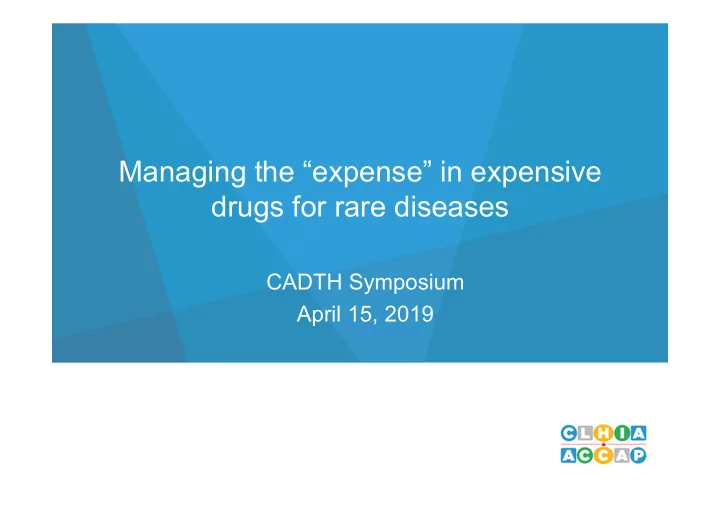

Managing the “expense” in expensive drugs for rare diseases CADTH Symposium April 15, 2019
AGENDA • Industry overview • Managing the expense • Closing thoughts
Health insurance
Industry Overview Canada’s life and health insurers play a key role in providing a social safety net to Canadians: 4
EXPENSIVE AND RARE DISEASE DRUGS MANAGING THE EXPENSE
Why Employers offer Benefits Included in total Included in total compensation compensation Attraction and Attraction and Support employee Support employee retention of employees retention of employees health to reduce health to reduce absence/injury and absence/injury and improve productivity improve productivity For some employers there For some employers there Driver of employee Driver of employee are requirements in are requirements in satisfaction satisfaction collective agreements collective agreements
The Challenge • Canadians pay some of the highest prices in the world for their medications • Increasing prevalence of high cost drugs- cost of specialty drugs is anticipated to reach 40% of prescription drug costs by 2022 ** • Balancing affordability with providing access ** Source: Drug Trends Report , Express Scripts Canada
Managing the Expense • Private drug plans are more likely to offer new, innovative drugs approved by Health Canada • According to research by the Canadian Health Policy Institute, of the 479 new drugs approved by Health Canada from 2008 to 2017, 87% were covered by at least one private drug plan** • Prevalence of high cost drugs remains a concern for plan sustainability • Insurers continually evolving products and processes to assist employers with managing plan costs While these will vary by insurer, the following are some examples: – Prior Authorization (PA) – Health Technology Assessments (HTA) – Private Listing Agreements (PLA’s) – Industry Drug Pooling (CDIPC) ** Canadian Health Policy Institute. Coverage of new medicines in public versus private drug plans in Canada 2008-2017
National Pharmacare • Industry believes that all Canadians should have access to affordable prescription medicines they need • Comprehensive reform is needed leveraging the strengths of the existing system • Any reform should include 3 key elements: – Providing drug coverage for everyone – Protecting and enhancing existing benefit plans – Ensure affordability for consumers and taxpayers
Recommendation for rare disease drugs The CLHIA recommends that: • A national evidence based minimum standard formulary be established • It should provide for coverage of both chronic illnesses and drugs for rare diseases and set maximum allowable out-of- pocket amounts, possibly based on income, for all Canadians • The government should also work with the industry to establish a national risk-sharing model for rare disease and high cost drugs to ensure all regions and/or employers in Canada can afford to offer the minimum standard
Lowering Drug Prices Can Be Achieved Today Lower drug prices can be achieved today • The industry fully supports initiatives underway to address these high costs: – PMPRB proposed changes on how drug prices are regulated Better negotiating power through the pCPA • Currently, the pCPA only leverages half the market to negotiate lower prices • Public and private insurers should work together to bring the full volume of the Canadian market through the pCPA
Recent Developments Advisory Council on National Pharmacare : • Interim report released March 2019 • Recognized the unique challenges of funding and accessing expensive drugs for rare diseases • Final report expected in June Federal Budget 2019: • Committed funding for drugs for rare diseases • Committed 4 year funding for development of Canadian Drug Agency
Closing Thoughts • System reform is needed to ensure all Canadians have access to affordable medications • Any reform needs to address access to rare disease drugs • Lower drug prices can be achieved today • A reformed system must ensure the continued viability of the health benefits plans that the majority of Canadians rely upon and value today. • The industry looks forward to collaborating with government to develop sustainable solutions that will improve access to affordable medications for all Canadians
Recommend
More recommend